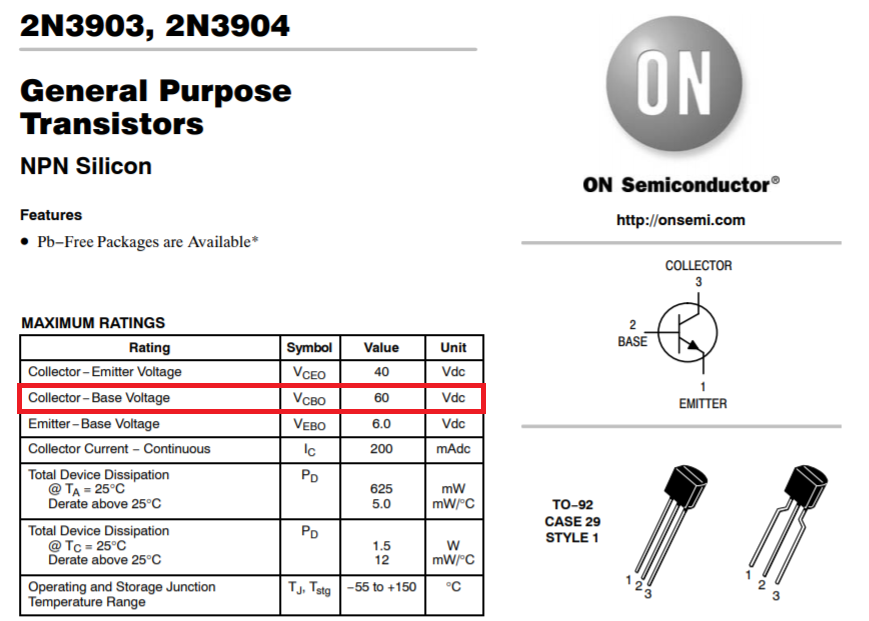If I ground the base of a NPN transistor (which means no current is passing through the transistor) with a VCE limit of 60 V, can I connect a higher voltage than its rating to collector of the transistor?
-
1\$\begingroup\$ No you can't. Read the data sheet or link a data sheet. \$\endgroup\$– Andy akaCommented Nov 14, 2020 at 11:47
-
2\$\begingroup\$ What is your understanding of Vce limit? What do you think might happen when you exceed it? Edit your thoughts into the question. \$\endgroup\$– TransistorCommented Nov 14, 2020 at 11:48
-
1\$\begingroup\$ If I ground the base of a NPN transistor (which means no current is passing through the transistor) You mean short the base and emitter. Grounding the base isn't enough unless you ground the emitter as well. Also, ground is just a reference point. When I connect both base and emitter to + 5 V, with the collector at + 10 V, still (almost) no current flows. \$\endgroup\$– BimpelrekkieCommented Nov 14, 2020 at 12:47
-
1\$\begingroup\$ The maximum Vce (valid for Vcb as well) doesn't care is current is flowing or not. If you want more that Vce = 60 V you will need to use a different transistor. \$\endgroup\$– BimpelrekkieCommented Nov 14, 2020 at 12:50
-
3\$\begingroup\$ can I connect a higher voltage than its rating to collector of the transistor? Absolutely. Yes you can. The transistor will likely be destroyed, but that's not the question you asked. To avoid destroying the transistor, keep VCE below 60 V. \$\endgroup\$– Neil_UKCommented Nov 14, 2020 at 14:09
1 Answer
Here's a typical commonly used BJT data sheet: -
If I ground the base of a NPN transistor (which means no current is passing through the transistor) with a VCE limit of 60 V, can I connect a higher voltage than its rating to collector of the transistor?
If you ground the base (i.e. connect it to 0 volts) then the collector voltage maximum (repeat maximum) voltage is 60 volts (irrespective of current being passed or not). That's what a maximum rating is - it's the point-of-abuse limit. Anything above is abuse and anything closer to 0 volts is not abuse. In truth though, to obtain best reliability you shouldn't really get to within 75% of that maximum limit. And by that I mean around 45 volts. And, I don't mean an average voltage I mean an instantaneous value so, 60 volts for 1 femtosecond or half an hour is equally abusive.
-
\$\begingroup\$ Thanks, I'm building a electronic load which I defined the maximum input voltage to 50V, I want to protect the BJT from over voltage, the input voltage is being monitored and read by an MCU. I was thinking to use a relay at the input but I couldn't find any relay with DC voltage rating of higher than 30V. do you think using a varistor is my only option? \$\endgroup\$ Commented Nov 14, 2020 at 13:46
-
\$\begingroup\$ I can't visualize how a varistor or relay will help protect your transistor. Why not get a transistor that is 100 volt rated? \$\endgroup\$– Andy akaCommented Nov 14, 2020 at 13:51
-
\$\begingroup\$ You mean they're too slow? I can't find the right transistor with TO-3 package, my only option is 2N3055 OR risk the money and buy something from a salvage store... \$\endgroup\$ Commented Nov 14, 2020 at 13:53
-
1\$\begingroup\$ Add it to the post because it should be open to others please. Or raise a new question because I'm too busy at the moment to do private stuff. Sorry. \$\endgroup\$– Andy akaCommented Nov 14, 2020 at 14:10
-
1

